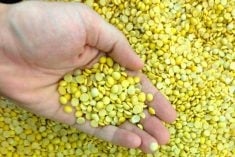Glacier Farm Media | MarketsFarm – There is some good news for the Canadian pulse industry after months of doldrums as the Indian government extended its duty-free period on its imports of yellow peas by 10 months. The Indian government made the announcement late in the day on May 30.
India is the world’s largest importer of yellow peas and Canada is one of the country’s main sources of the pulse.
The Indian government made the move just as the latest three-month extension was to expire. The new extension goes all of the way to March 31, 2026.
Read Also

U.S. grains: CBOT soybeans, corn, wheat fall in USDA data aftermath
Chicago grains took a dive on Friday, following a closely watched U.S. government crop report and the release of export data that could provide clues into Chinese buying.
“It’s a real and concrete signal that India is open for business,” said Greg Cherewyk, president of Pulse Canada.
Could push up prices, or lower them
However, MarketsFarm Pro analyst Mike Jubinville noted India still has to buy the peas from Canada but had a suggestion for growers.
“Nine dollars per bushel, fall delivery for new crop, I wouldn’t touch that,” Jubinville said, suggesting the price could increase.
Prairie Ag Hotwire listed old crop yellow peas at C$8.81 to C$10.25 per bushel delivered as of June 2. New crop was at C$8.75 to C$9.15/bu. delivered.
Vivek Agrawal, managing director of JLV Agro in India, said the Indian market is currently flooded with all sorts of pulses, which could result in lower domestic prices.
Also, he projected India’s yellow pea imports for 2025/26 at 1.5 million to two million tonnes, down from the current year’s 2.3 million.
Unlike Jubinville, Agrawal believes Canadian yellow pea prices might have to come down in order to compete with India’s imports from Russia. While Canadian yellow pea production is set to exceed three million tonnes, the Russian crop could reach upwards to five million tonnes.
China’s tariffs
Meanwhile, China continues its 100 per cent levy on yellow peas from Canada, as well canola meal and canola oil. These being part of the retaliatory measures China took against Canada for imposing 100 per cent tariffs on imports of Chinese-made electric vehicles, as well as 25 per cent surcharges on imports of steel and aluminum.
Cherewyk said he’s very pleased with the final statement that came from the June 2 first ministers’ meeting in Saskatoon. He said the communique expressed China’s tariffs need to come down immediately, and there are now government-to-government talks between Canada and China on those levies.
– With files from Sean Pratt, Glacier FarmMedia














